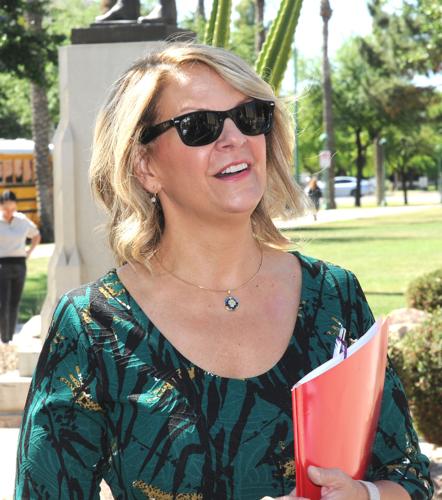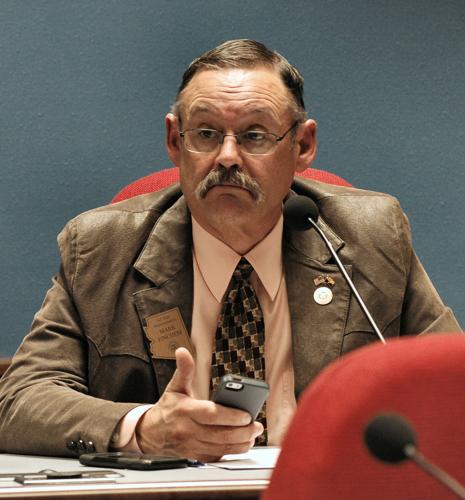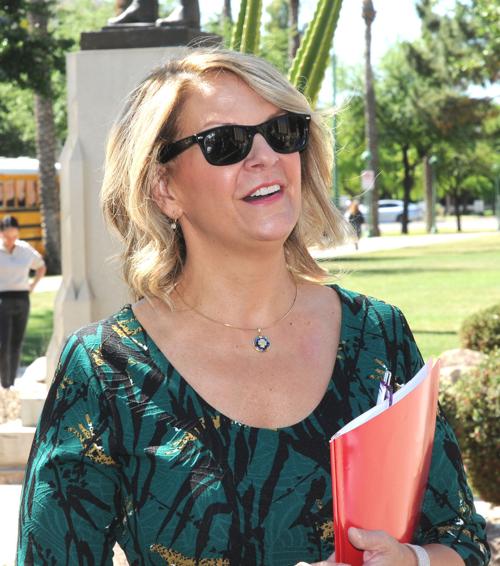PHOENIX — Unable to get permission for a formal hearing, “select” lawmakers are holding their own unofficial, away-from-the-Capitol event Monday, Nov. 30, to hear allegations from the Trump legal team on the election.
The event at the Hyatt Regency in downtown Phoenix is being billed as an “urgent public hearing” to air claims that improprieties altered the election results. Rep. Mark Finchem, an Oro Valley Republican, promised information to show that the state’s 11 electoral votes should not go to Democrat Joe Biden.
Yet, at the same time, Republican Gov. Doug Ducey, Republican Attorney General Mark Brnovich and Chief Justice Robert Brutinel are expected to formally certify the Arizona results as accurate.
The governor said he has seen no evidence of fraud in the election.
“I trust our election system. There’s integrity in our election system. Joe Biden did win Arizona,” Ducey said last week.
That leaves Finchem and the lawmakers who will attend looking for another way to overturn the results.
Their hearing comes after Republican House Speaker Rusty Bowers rebuffed Finchem’s efforts to call a hearing of the House Federal Relations Committee, which Finchem chairs, to look at ways the 2020 election could have been tainted.
“My worst fears have come to light in the process, and so far the evidence has been blocked from an official public forum,” Finchem said. “This process has been anything but transparent.”
He promised that the testimony, which is expected to feature Trump campaign lawyers Rudy Giuliani and Jenna Ellis, “is going to reveal a great deal that I think the taxpayers, the voters, are going to be stunned.”
Finchem argues that the U.S. Constitution empowers lawmakers to decide, on their own, whether the election was valid and, if not, to select the electors of their choice.
The hearing also comes as Kelli Ward, chairwoman of the Arizona Republican Party, goes to court Monday, trying to get access to certain voting materials she says will help prove her claim that the tally was incorrect, at least for the presidential race.
The issues are closely related, with the Trump campaign having raised some of the same allegations, particularly about possibility of fraud with mail-in votes.
Election employees processing and verifying ballots at the Pima County Election Center in Tucson on Nov. 4, 2020. (Josh Galemore / Arizona Daily Star)
Trump and allies have not won such cases
The lawmakers’ unofficial hearing Monday is likely to be a carbon copy of one held Wednesday by some Pennsylvania lawmakers — also off-campus — where Giuliani listed what he said were irregularities in not just that state but also in Arizona.
There, Trump, appearing by phone, repeated his claim that fraud in mail-in ballots altered the election returns. “They cheated,” he said of Democrats.
“This was a fraudulent election,” Trump continued. “That has to be turned around because we won Pennsylvania by a lot, and we won all of these swing states by a lot.”
He also complained about “all of the horrible things that happened to poll watchers.”
The theme has been repeated in Arizona — including in Ward’s lawsuit — that poll watchers were kept too far from the process to see what was going on. Ward’s attorney also questions whether signatures scanned from ballot envelopes matched what the county recorder’s offices already had on file.
So far, though, Trump and his allies have lost virtually every legal case they have brought alleging fraud or other improprieties.
Legislature “not tethered” to vote count, Finchem says
That, then, brings up the issue of what state lawmakers can do.
“The legal theory is the legislature has plenary (absolute) power to fulfill its obligation to send qualified Electoral College electors to engage in the vote,” Finchem said.
“This is a federal office,” he said. “And it is a federal obligation under the Constitution by the legislatures of the various states.”
As for the official vote tally, Finchem said, “We are not fettered, we are not tethered to anything other than our plenary power in the legislature to fulfill our duty.”
That, he argued, would allow a special legislative session where lawmakers could make their own decisions on the validity of the election and whether to try to block the state’s 11 electoral votes from being cast for Biden.
His claim dovetails with Ward’s lawsuit.
Under the system of mail-in voting, election workers compare signatures on the outside of the envelope with what they have on file from prior elections or other documents.
If there are questions, the signature is reviewed by members of both parties. The law allows election workers to contact the voters to determine if they really sent in the ballot and whether there is a reason a signature looks different, such as an illness or injury.
The problem, according to Ward’s attorney Jack Wilenchik, is what happens when the election worker says the signatures match, as there is no further review by party officials. Repeating the president’s claim, he said legal observers were kept too far away from the process to be able to see what was going on.
He is asking Maricopa County Superior Court Judge John Hannah to allow a representative sample — perhaps 2% — to be reviewed by a handwriting expert to determine if the workers were correct or if the ballots never should have been tallied.
Even if Hannah grants the review, and even if the expert says there are signatures that do not match, that in itself is no help to Ward’s cause. That’s because the ballots were long ago separated from the envelopes and there is no way to tell for whom these people voted.
But Wilenchik hopes that a judge, confronted by evidence of a large number of invalid ballots, would void the results of the presidential race, prohibiting the state’s 11 electoral votes from going to Biden.
That, in turn, could open the door to the legislature appointing electors.
But that presumes that Bowers and Republican Senate President Karen Fann would consent to convening a special session.
Monday’s off-campus hearing is designed to raise enough questions to put pressure on them and other lawmakers to agree.
Wilenchik has a second legal theory that damaged ballots were not properly duplicated for scanning. He wants these reviewed, too, with the idea that if there were sufficient votes that should have gone to Trump, Hannah should order that he is the winner.
Timing, state law may work against Finchem and Ward
There are things working against both the lawsuit and any potential legislative intervention.
Arizona law allows a challenge to the official canvass within five days. Federal law also says that all election challenges must be resolved by Dec. 8, with electors set to vote six days later.
The state also has a “faithless elector” provision in law, which requires electors to vote for the presidential candidate who wins the state.
Legislative lawyers said it would take a change in statute to alter how presidential electors are appointed. And they said it’s too late to change that this year given that the electors already were chosen by voters.
Photos: Election protests in Phoenix
Election protests in Phoenix
Updated
EDS NOTE: OBSCENITY - A Trump supporter stands outside the Maricopa County Recorder's Office, where votes in the general election are being counted, Thursday, Nov. 5, 2020, in Phoenix. (AP Photo/Matt York)
Election protests in Phoenix
Updated
A supporter of President Donald Trump yells at a counter-protester outside the Maricopa County Recorder's Office, Thursday, Nov. 5, 2020, in Phoenix. (AP Photo/Matt York)
Election protests in Phoenix
Updated
Maricopa County sheriff's officers clear a street outside the Maricopa County Recorder's Office, Thursday, Nov. 5, 2020, in Phoenix. (AP Photo/Matt York)
Election protests in Phoenix
Updated
Counter protesters engage with pro Trump supporters in the street outside the Maricopa County Recorders Office, Thursday, Nov. 5, 2020, in Phoenix. (AP Photo/Matt York)
Election protests in Phoenix
Updated
Counter-protesters, let, engage with supporters of President Donald Trump, right, outside the Maricopa County Recorder's Office, Thursday, Nov. 5, 2020, in Phoenix. (AP Photo/Matt York)
Election protests in Phoenix
Updated
Supporters of President Donald Trump mix with opponents outside the Maricopa County Recorder's Office, Thursday, Nov. 5, 2020, in Phoenix. (AP Photo/Matt York)
Election protests in Phoenix
Updated
Far right radio host Alex Jones rallies pro Trump supporters outside the Maricopa County Recorder's Office, Thursday, Nov. 5, 2020, in Phoenix. (AP Photo/Matt York)
Election protests in Phoenix
Updated
Far right radio host Alex Jones walks through the rally of pro Trump supporters outside the Maricopa County Recorder's Office, Thursday, Nov. 5, 2020, in Phoenix. (AP Photo/Matt York)
Election protests in Phoenix
Updated
Trump supporters listen to a speaker as they gather outside of the Maricopa County Recorders Office where votes in the general election are being counted in Phoenix, Thursday, Nov. 5, 2020. (AP Photo/Dario Lopez-MIlls)
Election protests in Phoenix
Updated
A Qanon believer speaks to a crowd of President Donald Trump supporters outside of the Maricopa County Recorder's Office where votes in the general election are being counted, in Phoenix, Thursday, Nov. 5, 2020. (AP Photo/Dario Lopez-MIlls)
Election protests in Phoenix
Updated
Maricopa County Sheriff's clear the street outside the Maricopa County Recorder's Office after Pro Trump supporters and counter protesters spilled into the street, Thursday, Nov. 5, 2020, in Phoenix. (AP Photo/Matt York)
Election protests in Phoenix
Updated
Armed supporters of President Donald Trump stand outside of Maricopa County Recorder's Office where votes in the general election are being counted, in Phoenix on Thursday, Nov. 5, 2020. (AP Photo/Dario Lopez-MIlls)
Trump campaign files suit in Arizona as vote gap narrows
UpdatedPHOENIX — Arizona Republicans are still hoping to pull out a “win” for President Trump, even if it doesn’t end up mattering on the national level — and even if it takes going to court.
The Trump reelection committee and the state and national Republican parties filed suit Saturday contending that procedures used in Maricopa County resulted in some voters’ ballots not being tallied. They want a judge to bar the election results from being certified until certain disputed ballots are reviewed.
The lawsuit comes as the latest tallies Saturday added 32,478 new votes in Arizona for the president over Friday night’s figures, compared to 23,835 for Democrat Joe Biden.
That put Trump within about 21,000 votes of taking the lead.
More to the point for Republicans, the daily spread gives the president about 57.7% of the votes between him and Biden. That is close to a rate that, if it continues, is enough to make up the difference by the time all the votes are counted, GOP officials contend.
But it’s going to be close.
There were only about 118,000 votes yet to be tallied.
If Trump continues at that 57.7% rate, he would get about 68,170 of those votes. That would bring his total to slightly more than 1.674 million.
Conversely, Biden getting 42.3% of what’s left would add about 49,974 to his total and put him over 1.677 million — about a 2,000-vote edge.
And that doesn’t account for the fact that Libertarian Jo Jorgensen has been pulling in about 1.5% of all the votes cast in the state.
Arizona GOP spokesman Zach Henry said Saturday that, as far as the party is concerned, nothing has changed from Thursday or Friday when party Chair Kelli Ward argued there is a path to victory for the president. In fact, he said, the Saturday numbers only “reinforce it.”
But that didn’t stop the party from filing suit.
The litigation concerns what happens when automated equipment at polling locations rejects a ballot due to defects, stray marks or other problems.
Voters have an option to cast a new ballot. They also can deposit it into a separate drawer within the device, with the idea that people working at the counting center will review it and determine the voter’s intent.
But Republicans’ attorney Kory Langhofer said what has happened is that some voters, based on advice from poll workers, simply chose to have the problematic ballots submitted as is, meaning no further review.
What that means, he said, is that if a field on the ballot contains what the machinery considers a defect or irregularity, the voter’s intended selections will not be tabulated “even if the voter’s intent could be discerned by a visual review of the ballot.”
Langhofer wants a judge to order a visual review of those ballots once they are identified.
There was no immediate response from Maricopa County Recorder Adrian Fontes.
Democrats declare Arizona for Biden
Democrats, for their part, were more than anxious to declare victory.
“Arizona has delivered its 11 Electoral College votes to now President-elect Joe Biden,” said state Democratic Party Chair Felecia Rotellini in a prepared statement Saturday.
Election department employees process and verify ballots from the 2020 General Election at the Pima County Election Center in Tucson on Nov. 2…
“We are a part of the broadest coalition ever assembled by a Democratic presidential nominee in Arizona,” she said. “We built the kind of team we needed to succeed.”
A Biden win in Arizona would be a Democrat’s first in a presidential race in 24 years.
Rotellini also celebrated that Arizona will have two Democratic U.S. senators, something that hasn’t occurred in more than half a century — when Harry Truman was president. Mark Kelly halted Martha McSally’s bid to keep the Senate seat she got last year from Gov. Doug Ducey that used to belong to John McCain.
Kelly, however, gets just the last two years of McCain’s original term before he has to seek reelection in 2022.
The presidential and Senate races were in many ways linked in Arizona.
McSally banked on her loyalty to Trump to carry her over the top. But as it ended up, she got fewer votes in Arizona than the president.
Ducey defended his 2018 decision to name McSally to the vacant post on the heels of her having just lost that year’s Senate election to Democrat Kyrsten Sinema.
“The governor is very proud of his appointment,” Ducey press aide Patrick Ptak told Capitol Media Services. He called McSally “an exceptional public servant who has delivered again and again for her constituents.”
Mixed results in down-ticket races
Neither Democrats nor Republicans managed to flip any U.S. House seats in Arizona, with the five incumbent Democrats and four Republicans winning reelection.
Democrats had high hopes of unseating Rep. David Schweikert, who was fined $50,000 for multiple ethics violations.
His win was an example of how Arizona Democrats’ overall goals for the election were less successful down-ticket than at the top of the ballot.
Their hopes of taking control of the Arizona House — or even picking up a single seat to get a 30-30 tie with Republicans — quickly faded.
In the state Senate, meanwhile, one close race in north-central Phoenix and Paradise Valley remains to be decided. But even if Democrat Christine Marsh defeats incumbent Republican Kate Brophy McGee there, it would still leave Republicans with a 16-14 edge in the Senate.
Further down the ticket, Maricopa County Recorder Fontes, a Democrat, was running about 2,500 votes behind Republican challenger Stephen Richer.
Rotellini said she was not discouraged by the results. “I think we held our own,” she said Saturday.
“I will agree that we weren’t as successful as we thought we would be,” she said. “And that means we need to go back and recalibrate, study the data and see where we excelled and where we could have had opportunities but didn’t.”
Why Arizona might still matter for Trump
One reason that Republicans are continuing to fight in the Arizona presidential race is that the results here could become meaningful if there is litigation in Pennsylvania that wipes out the 20 electoral votes that apparently went to Biden on Saturday.
An order by Justice Samuel Alito required election officials in Pennsylvania to separate out the ballots that came in after Election Day.
The Pennsylvania Supreme Court had earlier ruled that any ballot postmarked by the deadline should be counted. But the Trump campaign contends the U.S. Constitution empowers only the state legislature to make such decisions.
Alito did not forbid the state from counting those late-arriving ballots. But it opens the door for them being removed from the totals should the full high court side with the Republicans.
Also still in play as of Saturday were the 16 electoral votes from Georgia, where Biden was last leading, and 15 in North Carolina, where Trump was ahead.
PHOENIX — With President Donald Trump's reelection hopes looking worse by the hour, pro-Trump demonstrators held rallies in critical battlegro…









